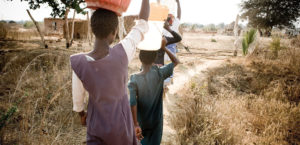 BBM is the unnamed “PCI Partner” in this story. You can read it below, or follow this link to PCI’s website. BBM is grateful to PCI for its partnership and support.
BBM is the unnamed “PCI Partner” in this story. You can read it below, or follow this link to PCI’s website. BBM is grateful to PCI for its partnership and support.
Thato, a nine-year-old girl from Mochudi, Botswana, is a survivor.
During a routine home visit, a PCI partner and local peer educator trained on how to spot child abuse, gender-based violence and exploitation observed Thato’s extreme health condition and took her immediately to a clinic.
Thato was severely malnourished, weighing only 38 pounds. She was referred to a hospital where she stayed for two weeks. In time, she was diagnosed with HIV and a gastrointestinal disease.
Thato’s HIV-positive mother is a single parent struggled to provide food and other basic needs for her five children. She relied on her oldest daughter, who also had HIV, to care for the younger children.
Weak and unable to fight sickness, Thato didn’t have the energy to attend school before receiving treatment. With proper Antiretroviral Therapy (ART), care and time, Thato’s health improved. She’s received support from a social worker and is receiving a food basket from the government. Today, she’s back in the classroom where she’s learning, growing and thriving.
Due to social and economic hurdles, many young women and girls around the world aren’t empowered to make their own health decisions. They don’t attend school because of social norms and marry at a young age. Violence and the threat of violence weaken their ability to protect themselves. This combination makes young women and girls more vulnerable to contracting HIV/AIDS.
More than two-thirds of all people living with HIV, 25.8 million, live in Sub-Saharan Africa—including 88 percent of the world’s HIV-positive children.
With funding from the President’s Emergency Plan for AIDS Relief (PEPFAR), PCI is implementing the Tsela Kgopo “Winding Road” Orphans and Vulnerable Children (OVC) & Gender project in Botswana.
Tsela Kgopo helps address factors that increase the vulnerability of OVC, adolescent girls and women, such as HIV/AIDS, chronic poverty, neglect, exploitation and abuse. To help communities help themselves, PCI supports community-based NGO partners with the resources and skills needed to serve as a bridge between government services and households, extend services to where they are needed most, and be sustainable. In 2015, the Tsela Kgopo project reached more than 13,500 people, like Thato.
Thato’s HIV-positive, pregnant sister was referred to a clinic and enrolled in a Prevention of Mother-to-Child Transmission (PMTCT) program. Thankfully, she received the treatment and gave birth to an HIV-free baby.
The peer educators, supported by PCI, continue to work with social workers to monitor the family’s situation with regular home visits. They continue to engage Thato’s mother and older sister in discussions to make responsible choices and keep Thato on treatment.
We can’t achieve an AIDS-free generation without reaching out to young women and girls. Our Tsela Kgopo program empowers them to live positively and find their voices.
0 Comments